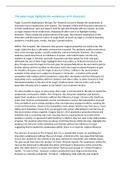‘The plays magic highlights the weaknesses of its characters’
Magic is used by Shakespeare through The Tempest not just to display the weaknesses of
characters but to exploit their true natures. The Tempest is filled with characters who give in
to their weaknesses, such as Prospero with his ego and Miranda with her naivety. As much
as magic exposes these weaknesses, Shakespeare often uses it to highlight existing
elements. These include the androcentrism of the play, the inherent weaknesses of the
characters and the island as a place of magic itself. As much as magic is crucial to exposing
weakness, it builds upon, mostly, the play’s gender politics.
Within ‘The Tempest’ the characters who possess magical properties are solely male, the
magic within the play is ultimately androcentric focussed. The Jacobean audience perceived
men as the stronger gender; socially, politically, and economically. However, the modern
audience would view this as an imbalance of power. Ariel and Prospero are the only
wielders of magic in the play, and both characters use their power for their own gain,
ultimately the use of their magic highlights their insecurities as fictional characters in the
play. Prospero uses his magic for his own gain, he purposefully drives the sea mad to get his
brother Alonso and his courtiers on the island. Ariel uses magic to please Prospero to gain
his freedom. Prospero uses his magic to also hurt others, Caliban is the most evident
example of this where he is subject to Prospero’s ‘torments’. A modern critic would
sympathise with Caliban and his treatment. Living after colonisation and the Holocaust it is
impossible not to sympathise with his character and others alike, as other characters ‘find
themselves helpless in the face of his magic’ (Andrew Green, literary critic), such as the
powerless Miranda who is subject to her father’s own economic desires.
It is also possible to argue, in some ways, that magic is not essential in the play to exploit the
weaknesses of character. Within ‘The Tempest’, the characters Sebastian and Antonio
depict their weakness of character without the influence of magic. Literary critic Northrop,
states that ‘Antonio and Sebastian are the real dreamers sunk in the hallucination of greed’.
They are both of and in similar positions; they are traitorous younger brothers, wanting the
crown for themselves, shown in the temptation scene where Antonio says that sees a crown
falling upon Sebastian’s head. They are arrogant and cynical, attempting to commit one of
the most serious crimes; regicide. Gregory Doran’s 2012 production presents Antonio and
Sebastian duo as conniving and cruel, dressing them in royal garments to present their
position in society, in agreement with Northrop’s criticism, they are sunk in the hallucination
of greed. The moment when they are about to kill King Alonso within the play, highlights the
weakness of character within Sebastian and Antonio without the influence of magic,
suggesting that to exploit the weaknesses within, there is no need for magical influence.
The absence of women in The Tempest also has a considerable impact on exploiting the
characters weaknesses without the use of magic. A feminist critic may argue that Miranda
acts as the catalyst for the entirety of the play, without her femininity and civilised nature,
the play would have been the product of chaos. Miranda exploits the weaknesses within the
men on the island and is ultimately the driver of Prospero’s forgiveness at the end of the
play. She states that it is a ‘brave new world/ That has such people in’t’ where Prospero
replies, ‘Tis new to thee’. However, modern productions have begun characterising
Prospero as a female protagonist, ‘Prospera’, challenging male authority and magical




